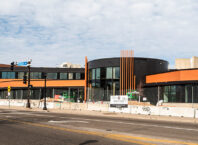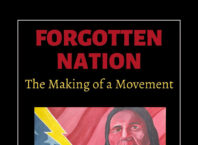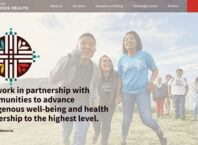 Marking a milestone in tribal
Marking a milestone in tribal
relations, the Minneapolis City Council voted unanimously on April 25
to recognize Indigenous Peoples Day on the second Monday in October,
effectively replacing Columbus Day on the civic calendar.
The gesture by the city government
speaks to years of struggle for recognition and equity by members of
the city’s Native American population. As one of the cities with a
high Native population in the country and birthplace of the American
Indian Movement, it hasn’t been until recently that city officials
embraced its indigenous history. In 2012 on the sesquicentennial of
the Dakota War, efforts began to understand the state’s history from
a Native perspective.
To that end, momentum has been
building in the community – focused through the Native American
Community Development Institute – to address issues of equity and
justice. The organization, led by Jay Bad Heart Bull
(Oglala/Hunkpapa) and Daniel Yang (Anishinabe) utilized its political
and human capital to build a dialogue with city leaders, beginning
with last year’s mayoral election.
Then mayoral candidate Betsy Hodges
committed to taking Native issues seriously at the city level during
her campaign in the summer and fall of last year. Along with Council
Rep. Alondra Cano (Ward 9) and policy aide Ashley Fairbanks
(Anishinabe), the effort went into full force last month when the
resolution to change the name of the holiday was drafted.
Members of the Native community filled
the city council chambers while Clyde Bellecourt, American Indian
Movement co-founder, Bill Means, International Indian Treaty Council,
and Deanna Standing Cloud, Red Lake Nation, addressed the city
council.
“I’m here to take a stand so my
daughter Breanna and my son Nigozis are able to grow up in a city
where they feel safe, respected and honored. Replacing Columbus Day
with Indigenous Peoples Day in the city of Minneapolis would show my
children that it’s never too late for healing and reconciliation to
occur between communities and throughout Turtle Island,” Standing
Cloud said.
 Bad Heart Bull was quick to give
Bad Heart Bull was quick to give
credit for this generation’s position influencing policy. In an
interview last month he said, “NACDI was the catalyst in working
with the community, but it builds on decades of work from other
organizations, groups and thousands of activists that have worked to
push this … It’s the Bellecourts, the grandmas, the youth groups,
Little Red Schoolhouse, Heart of the Earth. We’re just lucky stand on
the shoulders of all of these great leaders, activists and advocates
in our community. We feel like we would be doing a disservice if we
didn’t try to push even further and build on top of that foundation
that the laid for us young folk.”
On the morning of the vote, government
officials and hundreds of community members gathered in City Hall to
pay their respects not only to the efforts of those civic leaders to
address the issue, but to the shared history that led to the day.
“We get to acknowledge that – not
just history – but a living, breathing relationship, a living,
breathing community that is at the heart of the city of Minneapolis.
I want to thank the community for organizing, I want to thank the
community for insisting on its own behalf that we are one
Minneapolis, we are one city, that we are one people and we should
acknowledge that – officially and formally – as a city,” Hodges
said.
As the Congressional representative
for Minnesota’s Fifth District, encompassing much of the city, Rep.
Keith Ellison acknowledged the history and his admiration for Native
issues.
“I remember standing at the docks of
northern Minnesota and Wisconsin as Native fishermen were trying to
just extend their right to hunt and fish per agreement and were being
contested by hostile crowds,” he said. “The very foundation of
the United States, the theoretical concept of it, offered to our
nation by the Iroquois Confederacy, as we were told growing up, ‘Oh,
this is from the Greeks.’ We weren’t told about the Iroquois
Confederacy, but we learned about it. And now that we have
established Indigenous Peoples Day, every child – whether that
child is Native, or whether that child is not – will learn the
truth about where America really, really comes from.”
In his speech to the city council,
Means made note of the shift in attitude toward the Native community
during his lifetime. “It’s kind of refreshing to come and be
invited to this chamber because usually we have a drum outside, three
or four-hundred people marching … and so this marks a great change
in our relationship to be able to come to this legislative body with
an idea that has come to fruition: the recognition of indigenous
peoples.”
Touching on an identity widely known
throughout tribal communities but generally unknown to mainstream
America, Means expounded, “We too, as indigenous peoples, have a
creation story to tell. We too have a language, a culture, a
government that governs our people. This is the beginning of the
recognition of those contributions to the United States and indeed
here, to Minneapolis.”
Ellison briefly spoke about his
experience in learning history from an outsider’s perspective. “This
is so important because it’s difficult to imagine if you’re from a
mainstream experience, how it feels to sit in a classroom and be told
‘Oh yeah, well you know, there was this darkness and then Columbus
came and then there was light.’”
For her part, Standing Cloud, 35,
described what it was like for someone of her generation to have
grown up with the legend behind Columbus. “I remember feeling lied
to and really deceived and then after working through it for awhile,
it wears on you. It affects a kid’s self-esteem – everybody’s
self-esteem – because you’re celebrating a man that murdered
millions of your relatives and then, there’s a national holiday for
him,” she said.
“It’s kind of confusing for
indigenous children to work through that and resolve that because
there’s no protocol and no institutions are going to help anybody
reconcile that. So I guess that it’s a little challenging for young
people trying to find their identity.”
 In the summation of the complexity of
In the summation of the complexity of
identity in the state of Minnesota, Council President Barbara Johnson
(Ward 4) wove a rich history of her own family’s ancestors as they
watched history unfold in Minneapolis.
“One of my relatives who came from
France was a man named Joseph Renville and he had a son, the son had
a Lakota wife. Joseph was a fur trader, he had a post, he translated
the Bible from English to Lakota and he has a remarkable history in
this state. He married into Little Crow’s family,” she said.
“Joseph had a brother named Victor
Renville and he was – in this brutal history – scalped by Ojibwe
people. Victor’s son – Gabriel – was raised by Joseph. Gabriel
was an integral part in the Dakota Conflict. He worked against his
relatives, who were Little Crow’s family, and defended some of the
settlers who were involved in the conflict. Gabriel went with a
number of Renvilles to Fort Snelling and spent that very, very cold
winter there and their names are reflected on a plaque there.”
Johnson continued, “I represent
people that have Italian history and some are offended by this
change, this recognition, but I think it’s about all of us moving
forward and understanding the strength that we have because of all
the different groups that have impacted this community long ago and
today … I think on the second Monday of October, we’ll all be
reminded about the challenges that we have, but also the joint
successes that we have as a community.”
While the resolution is only binding
on city government, communications and policy, it also encourages
city businesses, organizations and public entities to recognize
Indigenous Peoples Day. According to Bad Heart Bull, the next step is
to approach the city of Saint Paul to consider a similar resolution
with a long-term goal of doing the same at the state level.
PHOTOS BY JAIDA GRAY EAGLE | THE CIRCLE
Top: Bill Means, International Indian Treaty
Council co-founder, found it refreshing to be part of a group of
Native American activists who were invited into the city council
chambers. “Usually we have a drum outside, three or four-hundred
people marching.”
Middle: Deanna Standing Cloud triumphantly
holds her copy of the City of Minneapolis Indigenous Peoples Day
resolution, passed unanimously by the council and signed by Mayor
Betsy Hodges.
Bottom: Drum group Ringing Shield celebrated
the passage of Indigenous Peoples Day in the rotunda of city hall
along with scores of Native American community members with a round
dance.






